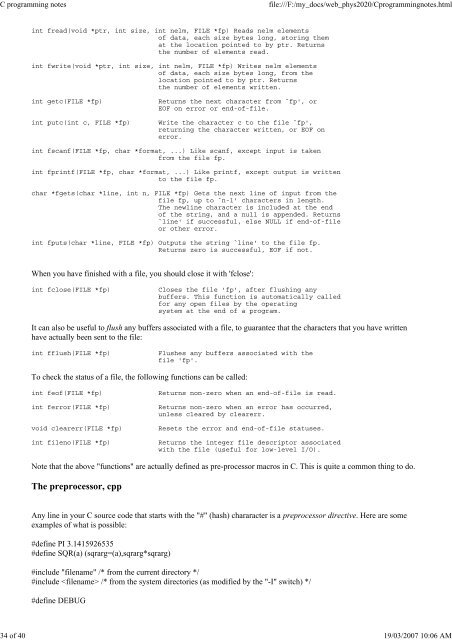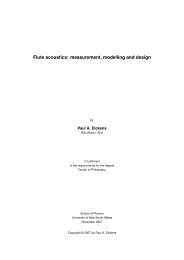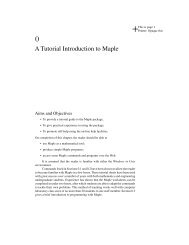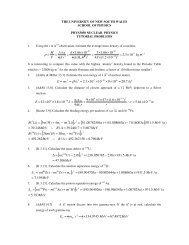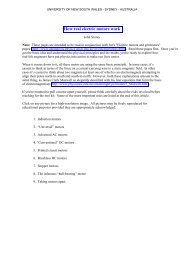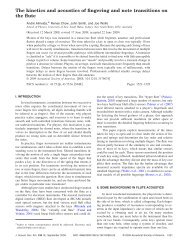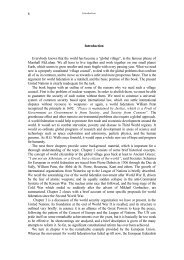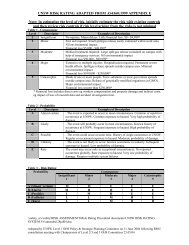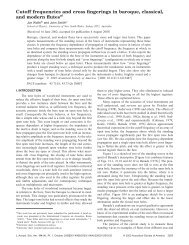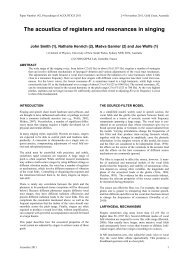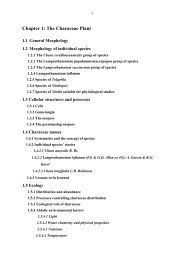C programming notes - School of Physics
C programming notes - School of Physics
C programming notes - School of Physics
You also want an ePaper? Increase the reach of your titles
YUMPU automatically turns print PDFs into web optimized ePapers that Google loves.
C <strong>programming</strong> <strong>notes</strong><br />
file:///F:/my_docs/web_phys2020/C<strong>programming</strong><strong>notes</strong>.html<br />
34 <strong>of</strong> 40 19/03/2007 10:06 AM<br />
int fread(void *ptr, int size, int nelm, FILE *fp) Reads nelm elements<br />
<strong>of</strong> data, each size bytes long, storing them<br />
at the location pointed to by ptr. Returns<br />
the number <strong>of</strong> elements read.<br />
int fwrite(void *ptr, int size, int nelm, FILE *fp) Writes nelm elements<br />
<strong>of</strong> data, each size bytes long, from the<br />
location pointed to by ptr. Returns<br />
the number <strong>of</strong> elements written.<br />
int getc(FILE *fp)<br />
Returns the next character from `fp', or<br />
EOF on error or end-<strong>of</strong>-file.<br />
int putc(int c, FILE *fp)<br />
Write the character c to the file `fp',<br />
returning the character written, or EOF on<br />
error.<br />
int fscanf(FILE *fp, char *format, ...) Like scanf, except input is taken<br />
from the file fp.<br />
int fprintf(FILE *fp, char *format, ...) Like printf, except output is written<br />
to the file fp.<br />
char *fgets(char *line, int n, FILE *fp) Gets the next line <strong>of</strong> input from the<br />
file fp, up to `n-1' characters in length.<br />
The newline character is included at the end<br />
<strong>of</strong> the string, and a null is appended. Returns<br />
`line' if successful, else NULL if end-<strong>of</strong>-file<br />
or other error.<br />
int fputs(char *line, FILE *fp) Outputs the string `line' to the file fp.<br />
Returns zero is successful, EOF if not.<br />
When you have finished with a file, you should close it with 'fclose':<br />
int fclose(FILE *fp)<br />
Closes the file 'fp', after flushing any<br />
buffers. This function is automatically called<br />
for any open files by the operating<br />
system at the end <strong>of</strong> a program.<br />
It can also be useful to flush any buffers associated with a file, to guarantee that the characters that you have written<br />
have actually been sent to the file:<br />
int fflush(FILE *fp)<br />
Flushes any buffers associated with the<br />
file 'fp'.<br />
To check the status <strong>of</strong> a file, the following functions can be called:<br />
int fe<strong>of</strong>(FILE *fp)<br />
int ferror(FILE *fp)<br />
void clearerr(FILE *fp)<br />
int fileno(FILE *fp)<br />
Returns non-zero when an end-<strong>of</strong>-file is read.<br />
Returns non-zero when an error has occurred,<br />
unless cleared by clearerr.<br />
Resets the error and end-<strong>of</strong>-file statuses.<br />
Returns the integer file descriptor associated<br />
with the file (useful for low-level I/O).<br />
Note that the above "functions" are actually defined as pre-processor macros in C. This is quite a common thing to do.<br />
The preprocessor, cpp<br />
Any line in your C source code that starts with the "#" (hash) chararacter is a preprocessor directive. Here are some<br />
examples <strong>of</strong> what is possible:<br />
#define PI 3.1415926535<br />
#define SQR(a) (sqrarg=(a),sqrarg*sqrarg)<br />
#include "filename" /* from the current directory */<br />
#include /* from the system directories (as modified by the "-I" switch) */<br />
#define DEBUG


